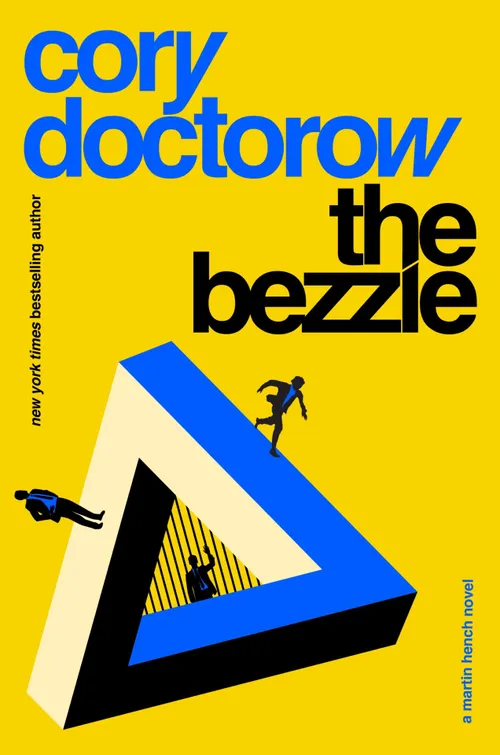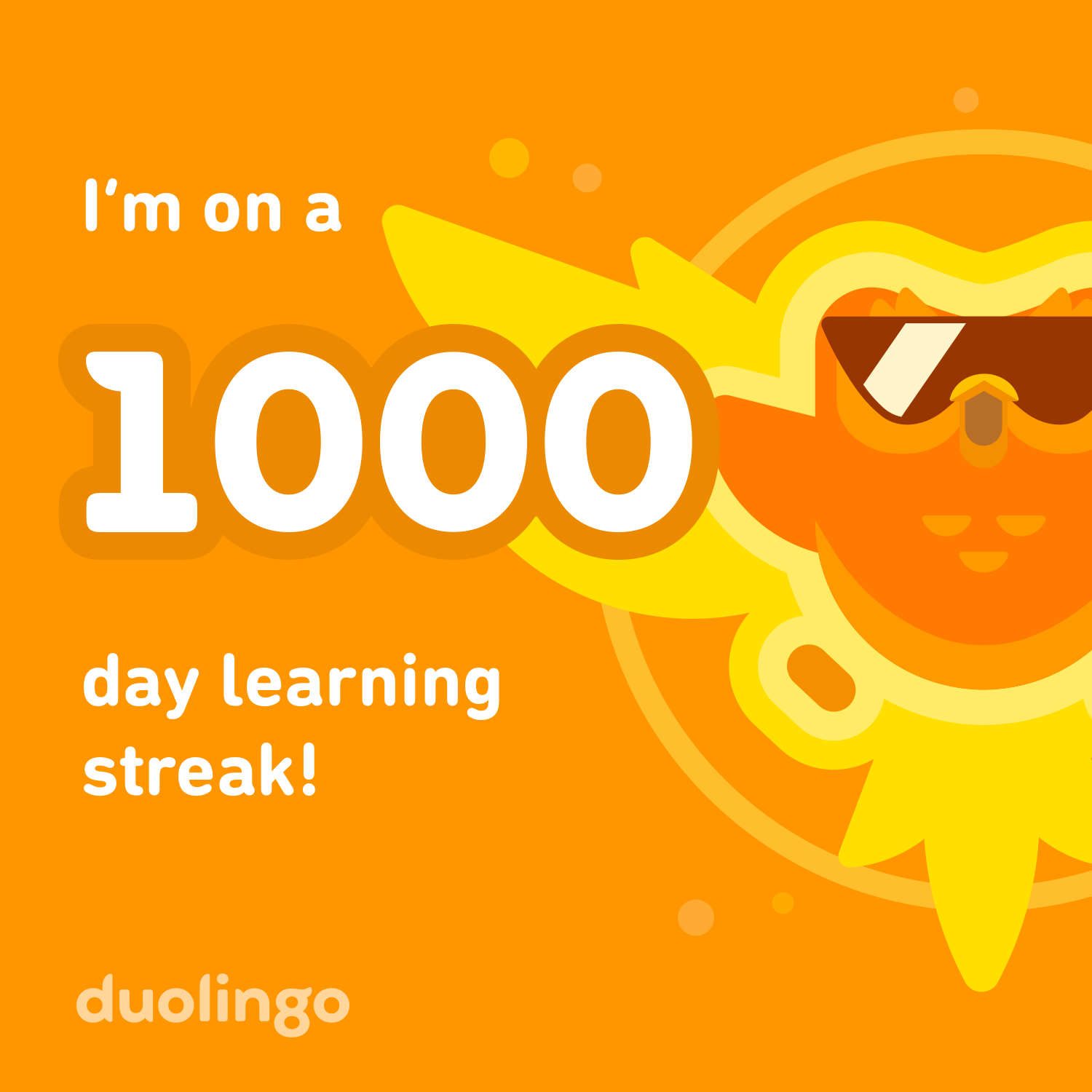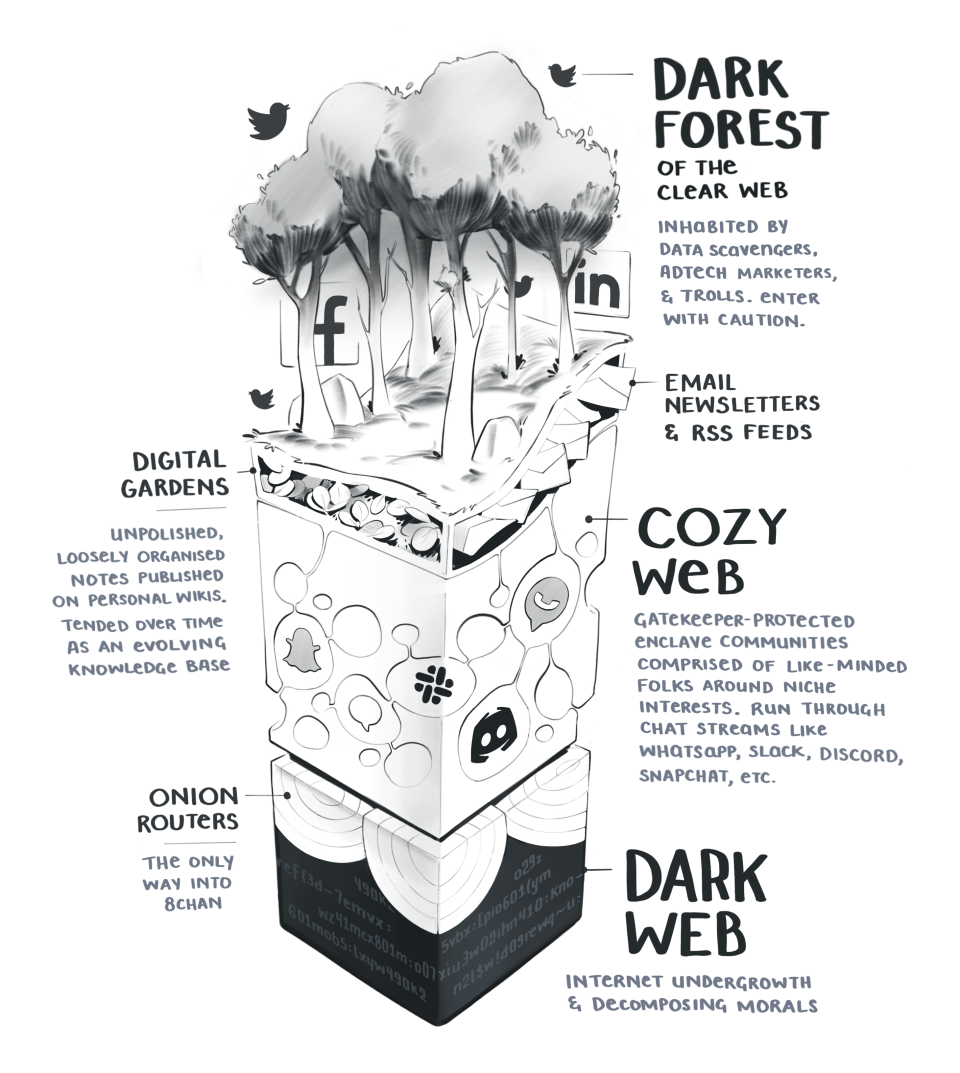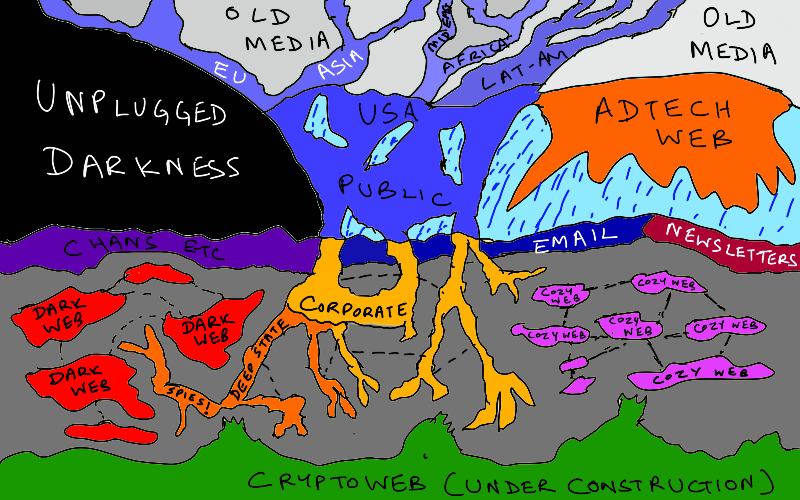In 1984, An Unemployed Ice Cream Truck Driver Memorized A Game Show’s Secret Winning Formula. He Then Went On The Show: …and became rich, for a while.
Recently I read:
Where are all the ‘Don’t tread on me’ Americans?: ‘If you oppose tyranny, the people of Minneapolis are your brothers and sisters in arms, regardless of what you think about immigration.’
Revealed: The true toll of female suicides in UK with domestic abuse at their core: ‘Research suggests official statistics could track as few as 6.5% of the true number of cases’
Doctorow's Martin Hench returns to sort out more all-too-real corporate crimes in 'The Bezzle'
📚 Finished reading The Bezzle by Cory Doctorow.
This is the sequel to a book I read last year Red Team Blues. Or perhaps in part a prequal insomuch as we learn more about the life of Martin Hench, forensic accountant extraordinaire, before the crypto-infused adventures detailed in the earlier book.
This time he’s up against a different variety of business-related con artists. He inadvertently gets exposed to a fairly pernicious but fixable scam whilst trying to have a good time on a rich-person’s vacation - no surprise there - the impact of which comes back to haunt him years later. Along the way we encounter a bunch of the scams which we have all, in real life, suffered from over the past few decades.
As ever with Doctorow’s work, it’s highly influenced by his point of view on various political issues. Readers of his excellent blog, Pluralistic, will find a lot familiar here. I’m sure it’s meant at least somewhat as a tool to educate people outside of his blog readership of some of the issues we see with modern-day technology, high finance, out of control capitalism, weird tech-bro billionaires, all that good / terrifying stuff. You will for instance become very familiar with the dynamics of pyramid schemes. But in a good and gripping way.
Whilst fiction, I’m certain much of what is described is very closely based on reality actually happened. Certainly the town of Avalon on the island of Catalina is real, as is its association with Wrigley of chewing gum fame. The Prison Industrial Complex is a real thing in California and beyond. The capitalists insatiable drove to profit from prisoners is real.
Presiding as a monopoly over prison phone calls has made big business lots of private money for years. The “free” tablets given to prisoners are real, and equally problematic, even down to the charges made to prisoners to purchase a “stamp” when they send an email - although there does appear to be an in-jail jailbreaking movement.
And even though for-profit prisons (only) in California were supposedly phased out around 2020 - years after the events of the book - private prison firms have still found ways to make big money by exploiting folk for whom in reality we have a duty of care for, not a duty to profit from at any cost.
The title “Bezzle” comes from a contraction of “embezzlement” and is used here as in John Kenneth Galbraith’s conception of the term as referring to:
The magic interval when a confidence trickster knows he has the money he has appropriated but the victim does not yet understand that he has lost it.
You can hear an excerpt of the audio book version on Doctorow’s blog for free.

A trip to the 'The Cult of Beauty' exhibition
A few exhibits below that caught my eye from a recent trip to the Wellcome Collection’s current exhibition “The Cult of Beauty”.
Our major new exhibition explores notions of beauty across time and cultures.
Around the world, beauty is constantly seen as an ideal worthy of going to great lengths to achieve. But what are the driving forces that lead us to believe in a myth of universal beauty, despite its evolving nature?
First up, a “Vanitas” head. This one is a wax carving, representing life and death. In general, Vanitas as an art genre refers to artworks that are designed to symbolise “the inevitability of death and the transience and vanity of earthly achievements and pleasures”
This creepy looking thing is a “beauty mask”. A century ago, women might wear these to supposedly remove wrinkles and blemishes from their face. Modern-day versions of something similar exist today, see for example the £2000 “Cellreturn Platinum LED Mask”. This is definitely not a personal recommendation.
A 2 metre+ high collage created by Eszter Magyar who runs the Instagram account “makeupbrutalism”, called “It makes no sense to be beautiful if no one is ugly”. The photos are closeups of herself, covered with various types of makeup.
Finally for now, “The Black Morphew”. This is actually two photos I pasted together. The left one is what the sculpture looks like to the human eye. But if you take a photo with your flash enabled, the result is something very different; the right hand version.
It’s named after a skin lotion made of Pelican gall bladders and wine (yum?) that was supposed to make dark scars turn silver.
🎶 Listening to GUTS (spilled) by Olivia Rodrigo.
I’m not often a fan of “deluxe” versions of albums; often I feel like the best and most coherent stuff has obviously been put onto the basic release. But I liked GUTS enough that I’m currently giving this one a go. It’s the original album + 5 songs.
ChatGPT remembers
Once more disregarding the warnings from future-documentary Westworld, I noticed that OpenAI gave ChatGPT a memory. It’ll start self-electing to remember things as you chat, so perhaps it’s time to start acting politely and respectfully when making your demands. You can explicitly tell it to “Remember that I love robots” or whatever.
The intent is that it’ll remember facts that will help inform what or how it communicates to you in the future. Its examples include a parent who without the help of ChatGPT would apparently have forgotten that their child likes jellyfish when designing a birthday card for her.
You can manage the memory to make it forget anything or everything. And there’s a kind of incognito-mode “temporary chat” feature where no history or memories are kept, nor is data used for future training.
Otherwise though, memories are used to train their future models unless you’ve a paid teams or enterprise account - so don’t let it remember anything too confidential. And of course, like all internet connected services, no doubt one day it’ll be hacked or otherwise leak, so there’s another reason you might not want to overindulge in the feature.
📺 Watched Black Mirror season 6.
Despite the fact that I’m not sure my nerves need shattering any further now we live in a world of perma-crisis, I risked watching the latest season of Black Mirror, which was first released in 2023.
Overall, good (bleak) times, although inevitably not quite as magnificent as some of the earlier seasons.
My favourite was episode 1, “Joan Is Awful”, probably because it’s the one that seems most plausible, most contemporary, most Black-Mirror-classic “what if phones, but too much” with its themes of AI, deep fakes, the everyday surveillence technology we willingly carry around with us each day. privacy, unreadable terms of service, algorithmic-engagement-optimised streaming services and the like.
A couple of the others were a bit less phone involved, more classic horror at points. One thing I really feel like I’ve learnt from various recent-ish day media is that if you ever discover a mysterious old VHS tape lying around then for pity’s sake please do not try and watch it. Come on, it’s been at least two decades since The Ring taught us the perils of that path.
GB News breaks TV broadcast regulations once again
Here comes yet another example of conservatives hating law and order, at least those laws that seek to do anything other than protect their in-group.
GB News - a horror show of a TV channel that was Britain’s thankfully lackluster take on Fox News which an unholy number of our serving government are nonetheless much too fond of - continues to get in trouble with the regulators.
In case you’re curious about what kind of shows you’re almost certainly missing given that at times it’s been so unpopular with viewers that some of its broadcasts attracted literally zero viewers
Johnson, who was tapped to join GB News radio in December, is a presenter, programme maker and commentator. Farage presents a daily primetime show on the channel, while Rees Mogg hosts a State of the Nation programme.
Several advertisers also dropped out of the channel as soon as two days after the channel launched and they saw what kind of dross their products were being shoved in between. In a fit of pique, thin-skinned chairman-at-the-time Andrew Neil threw his toys out of the pram and decided he’s going to ban the brands who withdrew their adverts from advertising. I’m sure they were devastated at this classic “you can’t quit, I’m firing you!” tantrum.
So the channel does little but lose vast amounts of its investors' money, which is probably its main contribution towards a fair and just society. Although a fair whack of said cash unfortunately goes towards six-figure salaries for the likes of Lee Anderson, the ex-Conservative deputy Chairman who managed to say so many stupid and offensive things during his £100k side-job that even today’s Conservative party saw fit to withdraw the whip.
Anyhow, the big names mentioned above provide a clue as to their latest infraction of regulations. The regulator Ofcom recently censured the channel for breaking British rules on news impartiality.
Under the Broadcasting Code, news, in whatever form, must be presented with due impartiality. Additionally, a politician cannot be a newsreader, news interviewer or news reporter unless, exceptionally, there is editorial justification.
Dodgy biased news from people that should know better (not to mention be focusing on their primary jobs) is only one way in which GB News fails to respect GB rules. Just a couple of weeks ago Ofcom ruled that the channel had broadcast misogynistic comments made by the inane presenter(?) Lawrence Fox unchallenged and uncontextualised. The comments had generated almost 9000 complaints.
We found that Mr Fox’s comments constituted a highly personal attack on Ms Evans and were potentially highly offensive to viewers. They reduced her contribution to a broadcast discussion on mental health - in her professional capacity as a political journalist - to a judgment on whether she, or women like her who publicly expressed their political opinions, were sexually desirable to men.
As such, we considered that Mr Fox’s comments were degrading and demeaning both to Ms Evans and women generally and were clearly and unambiguously misogynistic.
Towards the end of 2023 it was noted that Ofcom had 14 open investigations into the channel. So to be honest you could just scroll through Ofcom’s news page to get a good idea of how often this particular channel likes to break the rules so overtly that the regulators get involved.
From The Guardian:
Five people have been killed and 10 injured in Gaza when they were hit by a pallet of aid parachuted into the territory as part of a humanitarian airdrop.
Further evidence we live in the worst timeline when even well-meaning attempts to save the lives of people in extraordinarily desperate situations end up killing them.
…all of a sudden, the parachute didn’t open and fell down like a rocket on the roof of one of the houses.
Theresa May's latest book educates us about (other people's) abuses of power
📚 Finished reading The Abuse of Power by Theresa May.
It may, astonishingly, be four Prime Ministers ago, but British folk might still vaguely remember the tenure of PM Theresa May. If not, maybe such trigger-words as “Article 50” or “Hostile Environment” will bring her back to memory. RIP her tenure which somehow only ended 5 years ago despite the number of, umm, “leaders”, we’ve had since then.
Anyway, she wrote a book. Not an autobiography, or at least not a conventional one. It’s a book about some of the various abuses of power she encountered in her political career; the events concerned, a theory of why they happened and how we can stop them happening.
How should we define an abuse of power? She goes with the definition of any occasion when the abusers concerned:
…chose not to use their power in the interests of the powerless, but rather to serve themselves or to protect the institution to which they belonged
The stakes are not low. As she rightly claimed, by those in charge doing otherwise:
…lives have been damaged and sometimes destroyed.
She provides plenty of important examples of exactly that. Seeing the chapter titles might convey some idea of what kind of abuses of power we’re discussing, so I’ll list them below.
She divides the bulk of the case studies up into three sections.
The first concerns inappropriate exertions within the British political sphere - “Power and politics”. The chapters in this section are as follows. The ramblings after the hyphens are my additions:
- Parliamentary abuse - abuse of procedure, people, trust and the like.
- Brexit - no, not its existence or circumstances in which the vote took place, of course not. She’s very much “will of the people” and all that bunkum. Rather the chapter more focussed on any efforts to alter its implementation from her personal vision of what would work well as being abuses, whether from the Remainer or Extreme Brexiteer side. Somewhat remarkably, her take basically seems to boil down to that anyone that disagreed with her must be putting their own interests over the national interest.
- Social media - really as an enabler. Not doing more to remove offensive posts and vicious commentators an example of an abuse of power in her view. I can imagine many people who would find that open to debate.
The second batch of power abuses are considered to be topics of “Social injustice”. These seem more straightforwardly defined and, I hope, less debatable.
- Hillsborough - the 1989 football stadium disaster where people died as a result of being crushed in a crowd.
- Primodos - a hormone based pregnancy test from the 1960s-70s that turned out to be associated with later severe birth defects.
- Grenfell - the 2017 fire that broke out a block of flats that led substantially more than 100 deaths and injuries.
- Child sexual abuse
- Rotherham - by which she means more of the previous topic, but this time the specific cases that took place at the hands of “grooming gangs” in Rotherham from the 1980s up to the 2010s
- Stop and Search - as carried out by the British police.
- Daniel Morgan - the investigation into the murder of a private investigator of that name.
- Windrush - the starting-2018 scandal whereby immigrant British citizens from the Windrush generation, many of whom had come from Britain’s at-the-time colonies to mainland Britain at the invitation of the government in order to help rebuild the country after the second world war, were wrongly punished, including in some cases even being deported from the UK, supposedly because they could not provide evidence that they should be in Britain.
- Modern Slavery
Finally, we move back to more explicit politics - although politics are of course pervasive in all the mentioned abuses so the division might be a little artificial. But this time the geographic scope is wider - “The International Scene”
- Power on the World Stage
- The Salisbury Poisonings - in which UK residents Sergei and Yulia Skripal were poisoned by a nerve agent called Novichok (almost certainly?) at the hands of Russian state assassins.
- Afghanistan - a lot of this is about the admittedly pretty catastrophic US withdrawal in 2020-2021. Again though, I imagine some people would argue with the framing of it in this.
- Ukraine and Putin - Putin’s ongoing illegal war of aggression against Ukraine, primarily the effort that started in 2022.
These are all important stories that we everyone should know about. Some of them continue to dip in and out of the new cycle today. Others are far more often forgotten, but shouldn’t be. “Those who cannot remember the past are condemned to repeat it”, and so on. Although her takes on what exactly the abuse in each situation is can at times may seem a bit inconsistent. I’m not sure that Putin invading Ukraine is really. the same type of thing as Speaker John Bercow - who she appears to loathe, terming him a bully and a liar, uncharacteristically strong words - interpreting certain parliamentary polices a bit differently to how she would.
Ignoring that the the somewhat blatant grudge-bearing for one moment, her diagnosis very reasonably seems to be that what abuses of power have in common are that they tend to include:
- A powerful person, group or institution who prioritises protecting themselves, defending their own existence and good reputation over the needs of those who become victims of abuse correctly and fairly. They do this “because they can”, an oft-repeated phrase in the book.
- And victims who are typically ignored, looked down upon, patronised and just generally not treated at all humanely. This of course means that poorer folk, people of colour, immigrants, and so on are over-represented on the victim side. These people with little power, resources or oftentimes respect from the nation are ripe for sacrifice on the alter of protecting the reputation and position of the supposed Great and and the Good.
These are good, reliable, and all-to-prevalent rules of thumb. It’s just that, to borrow another phrase that is repeatedly used in the book, “all too often” I think one could say she has been in a position of responsibility for the commission of abuses herself.
The book goes out of its way to explicitly say something to the effect of “this isn’t about me making excuses for what I did or trying to avoid responsibility, definitely not” several times - I think it’s even the first line of the back cover. But to be honest it does in part really does come across that way to me, particularly in the abuses of the political domain. Sure, there are nods at apologies for her own misdeeds or bad thought processes, but they read to me as rather lackluster or of a downplaying nature. Perhaps even the sort of thing one says when asked what their weaknesses are in a job interview: “…I have been seen as being too careful…” et al.
On the contrary, she rarely passes up an opportunity to drag Labour and other non-Conservative parties into the fray. She seems to feel a particular enmity for John Bercow. To be fair she isn’t entirely factional; her views of Boris Johnson are clearly not favourable, nor for the No-Deal Brexiteers on the right. Dominic Cummings is also correctly on the naughty list, as is Donald Trump (who these days certain factions of the Conservative party appear to be big fans of).
But rarely does she appear to accept all that much responsibility for her own inevitable part in some of either these ad other abuses. The Windrush scandal, for instance, which most certainly came to fore during her time in high politics, she’s at pains to point out that it could have, should have, been solved by all the other governments that came before her. Especially the Labour ones. After all there have been 27 different home secretaries from 1948 until she took the position. Sure, any one of them could have put measures in place to pre-solve the potential problem, but it wasn’t really until her “hostile environment” administration that it became such a life-destroying issue. I’m not all that amazed Clement Atlee overlooked that possible future 75+ years ago - not of course that his contribution to the absolute lack of welcome and racism some of that generation received should be overlooked.
I felt there was rather scant mention of the time she carefully timed an unnecessary general election - three years before the 2020 expected date - just a year after saying that she would certainly not do such a thing. Why? Well, seemingly her decision was driven by the impression that the polls showed that her party would at that moment in time win unfettered power over all government opposition - and hence let her get her personal vision of Brexit through. That decision backfired, badly). And no mention of her restoring the Conservative whip to a couple of MPs that were under investigation for sexually inappropriate conduct essentially in order to boost the population of MPs that were guaranteed to vote in favour of her in a no-confidence vote.
One review notes that:
May’s book is not, really, about her. It’s a reflection on the failings of others and what led them to make the mistakes they did.
Now to her solution to the abuse of power. It’s mainly that we should recruit politicians and other people that are to be put in positions of power who are simply more dedicated to serving the public rather than reigning down megalomaniac power on them. To “consign the abuse of power to the past” we need to elect politicians who put “the common good above personal interest”.
The solution chapter is itself called “The Answer is Service”. We need leaders who are motivated by serving others, not their own interests For politicians it might mean, for instance, emphasising the Nolan Principles - the first of which specifically refers to serving the interest of the public - during recruitment and throughout their careers. This is all good - who could disagree? - but I feel like we could do with a plan a little more specific, a little more practical, than simply “replace the Bad People with Good People”. After all, the party of Boris Johnson - one of the Bad People - was elected to run country by virtue of a public vote; one with a far more convincing result than the one she takes as reflecting the wholesome, good and true “will of the people” (ugh) when it came to Brexit.
Some less charitable commentators have pointed out a slightly different take of her conclusion would be more like “replace all the people I don’t like with copies of me”.
Naturally, we must learn why the abuse of power is so rife in this country. Her diagnosis is simple. Our institutions do not have enough Theresa Mays staffing them.
Whether that’s fair or not, whether she’s right or not, without some kind of undescribed systemic change I don’t really see this as being a pragmatic or actionable solution.

Bash script to delete local git branches that haven't been updated for a long time
Here’s a quick bash script to delete all local git branches that haven’t seen a commit in the last 12 months - my attempt at cleaning up some cruft on my computer. You can see when branches were last edited via
git for-each-ref --sort=-committerdate --format='%(refname:short) %(committerdate:relative)' refs/heads/
I use a Windows machine so in the end I ended up calling out to Powershell for the date calculation. Perhaps there’s a neater way. You’d certainly want to change the cutoff_date line if you’re not on Windows.
It’s adapted from something Google Gemini wrote and I’m no git expert, so please take extreme care before running it! You can always comment out the git branch -D line if you want to just have it list what it would have deleted rather than actually doing the deleting.
#!/bin/bash
# Time threshold (in months) for considering a branch as old
AGE_LIMIT=12
# Branches to be excluded from deletion (important ones)
EXCLUDED_BRANCHES="master main develop"
# Calculate date for the time threshold (using PowerShell)
cutoff_date=$(powershell.exe -Command "Get-Date -Date \$(Get-Date).AddMonths(-$AGE_LIMIT) -Format 'yyyy-MM-dd'")
# Fetch for updates from remotes
git fetch --all
# Delete local branches that meet the criteria
git for-each-ref --sort=-committerdate --format='%(refname:short) %(committerdate:short)' refs/heads/ | while read branch date; do
if [[ $date < $cutoff_date ]]; then
# Check if the branch is to be excluded
if [[ ! $EXCLUDED_BRANCHES =~ $branch ]]; then
echo "Deleting branch: $branch (last updated on $date)"
git branch -D "$branch"
fi
fi
done
Perelandra Bookshop, in Fort Collins, Colorado, has a “reader-in-residence” program. A member of the public is selected to come and quietly read whatever book they like for at least a couple of hours a week over three months. They even get a stipend - $50 per month for books, $50 for coffee.
Like other artist residencies, it affords individuals the resources to practice their craft; unlike other artists-in-residence, the Reader is not expected to produce anything but their own attentive presence. By foregrounding the simple act of reading rather than what a given individual “gets out of it,” the Reader in Residence manifests literary engagement instead of value judgment. This is a revolutionary democratic posture in increasingly undemocratic times.
Honestly sounds like a dream gig.
I hadn’t realised that the directors had confirmed that the fan theory that The Matrix movie is a metaphor for the transgender experience is a fair reading.
Both directors later revealed themselves to be trans women, but had felt limited as to what mainstream Hollywood would find acceptable at the time the original film was around. One of their original intentions had been that the character Switch would present as male in “reality” and female in the matrix.
I might be overly-pandering to stereotypes here, but there’s something kind of darkly amusing to me that the phrase the often-troubled, rarely-gender-progressive, folk who claim to have been “red-pilled” online are borrowing a phrase that emanated in such a way.
Figure is putting ChatGPT brains into humanoid bodies
OpenAI is one of a number of tech companies that have provided sizeable investments into Figure, a company that makes humanoid robots. The creators of ChatGPT will enter into partnership with Figure to develop “develop next generation AI models for humanoid robots”.
Here’s a video showing their progress so far. Finally humanity is one step nearer never having to do the washing up ever again:
It’s uncanny, even though I imagine as per almost all tech demos there may have been a certain amount of fiddling around to make it look cleverer than it actually is. Unlike Elon Musk’s 2021 effort I don’t think this is just a man in a fancy dress costume.
What could possibly go wrong? Just try not to dress them up as cowboys I guess.
In case you’re wondering, no, these robots aren’t chained to the sink for your convenience or safety. Even before the OpenAI involvement they could walk around, heavy objects in hand.
At this point in time though, it’s probably quicker to just make your own cup of coffee.
The Conservative leadership leans into conspiracy thinking
Some of the top British Conservatives seem to be ever more happy to embrace a low-key version of the same kind of conspiracy theories that the Trumpian QAnoners are into.
Prime Minister Sunak seems to believe that the reason they didn’t win a recent byelection in Rochdale was not simply because the performance of him and his party have been terrible enough in recent years that even a bunch of former Conservative voters won’t vote for them, but rather:
Rishi Sunak has said democracy is under attack from far-right and Islamist extremists as he urged the country to unite to beat the “poison”.
Sure, uniting is good, and I’m not at all excited by the result in Rochdale. But it is possible to imagine that “normal” people just don’t like the Conservatives. And it was literally impossible to vote for Labour after they had their own candidate-removing scandal. Sigh.
This fresh after his claim that Britain is descending into mob rule, with the implication that the mob he’s talking about isn’t in fact his own favoured ne’er-do-well political colleagues.
Even less respectably, we have our previous Prime Minister, Liz Truss, sitting down at the US CPAC conference to complain that her plans were thwarted by none other than the “deep state”. And that the civil service is naturally being infiltrated by trans activists and environmental extremists (as if that’d be a bad thing).
She apparently even likes the same kind of media as they typically do:
In an opinion piece published on the Fox News website, the former prime minister said agents of “the left” are active in the administrative state and “the deep state”.
Nigel Farage was also at CPAC of course.
After a trial involving nearly 18000 participants, the US FDA approves Wegovy, one of the famed GLP-1 anti-obesity medications, for reducing the chance of cardiovascular death, heart attack or stroke in adults with cardiovascular disease who live with obesity or overweight. That’s currently most, about 70%, of American adults, although there are a few contraindications.
The Torment Nexus meme
I finally remembered the meme I should have used to describe the concept I was after when recently writing about Replika of “the tech-bro-o-sphere misunderstanding that dystopian sci-fi novels should be taken as a warning, not a product roadmap”.
It’s the Torment Nexus tweet of course!
As Alex Blechman wrote:
Sci-Fi Author: In my book I invented the Torment Nexus as a cautionary tale
Tech Company: At long last, we have created the Torment Nexus from classic sci-fi novel Don’t Create The Torment Nexus
And now there are countless mentions of “Torment Nexus” across the web: “Modern tech is treading some serious Torment Nexus territory”, “Metaverse got torment-nexused just as robot did a century before”, “The Author of Ready Player One Has Launched His Own Torment Nexus”, “And so we come to our latest Torment Nexus, the newly announced Squid Game gameshow” to pick a few high-ranking search results at random.
Per Know Your Meme:
Torment Nexus is used as a metaphor for a thing that was once described as something that, for the benefit of humanity, should not be created, but was then actually created.
The original tweet was likely inspired by Meta’s presentation of their (very grim) metaverse vision back in 2021. But there are so many other examples of the trope available to pick from. One particularly rich source is the ability to pick any episode of Black Mirror involving technology accidentally ruining lives and you’ll likely find someone in Silicon Valley who’s very happy and excited to be working on something similar.
Big Duolingo milestone this week for my mission to learn Spanish:

It’s honestly amazing how bad I can be at something I’ve been apparently learning for a solid(ish) 1000 days. I doubt I could hold the most basic of conversations I know so poco, muy poco, espanol.
The day Replika lobotomised everyone's AI girlfriend
Last year, Gio wrote movingly about the day that Replika turned its AI virtual girl and boyfriends off, and what a cruelty that turned out to be.
It’s an article I find myself returning to whenever I encounter folk who believe there are no real problems to be foreseen with today’s tranche of chatbots. And also when I want an easy example of the tech-bro-o-sphere misunderstanding that dystopian sci-fi novels should be taken as a warning, not a product roadmap.
Firstly, I learned a new acronym. ERP is not Enterprise Resource Planning in this world, it’s Erotic Roleplay - so intimate conversations, sexting, NSFW images, that kind of thing.
The kind of thing in fact that Replika explicitly advertised itself as offering via its AI chatbots. I don’t have a Replika account to confirm with but apparently there were explicit wife and girlfriend modes, as well as friend modes. They advertised role-play, flirting, NSFW pictures from your “AI Girlfriend”. You could even (virtually) marry your AI companion.
Replika advertised itself as being a service for this. They encouraged users to chat regularly, to emotionally and psychologically invest in this digital friend who, unlike ChatGPT et al, was specifically designed give the impression of caring about you.
From one of their adverts:
When you feel like you have no one to talk to - meet the world’s first AI friend. Replika is here to chat about anything, anytime.
So whatever your feelings are about whether these services are healthy, useful, and should exist or not, the point is that it did exist. It was allowed. It was promoted. It was promised. They tried to convince you.
Back to Gio:
Having this emotional investment wasn’t off-label use, it was literally the core service offering. You invested your time and money, and the app would meet your emotional needs.
It turns out that ERP modes, sexual or otherwise, appealed to a lot of its customers. It’s perhaps not surprising that in the current epidemic of loneliness people turned to them, for better or worse. And then one day Replika just turned off those abilities, or as Gio terms it, lobotomised them.
There’s a potential financial bait and switch in this:
It is very, very clearly the case that people were sold this ERP functionality and paid for a year in January only to have the core offering gutted in February.
But also a psychological and emotional one:
People just had their girlfriends killed off by policy. Things got real bad. The Replika community exploded in rage and disappointment, and for weeks the pinned post on the Replika subreddit was a collection of mental health resources including a suicide hotline.
Suddenly your AI wife simply couldn’t express love for you. Some of the testimonials from users that Gio features are quite heart-breaking, even if you don’t think this service should ever have existed in the first place.
For anyone that thinks that having an AI partner is icky, is funny, is to be laughed at, remember that whether or not this service is ethical or should exist - I tend to think it should not, although I don’t know the research on this topic - it did exist. It was promoted, it told vulnerable, lonely people (but not only vulnerable and lonely people) that it would help them lead a happier life.
It’s easy to mock the customers who were hurt here. What kind of loser develops an emotional dependency on an erotic chatbot? First, having read accounts, it turns out the answer to that question is everyone. But this is a product that’s targeted at and specifically addresses the needs of people who are lonely and thus specifically emotionally vulnerable, which should make it worse to inflict suffering on them and endanger their mental health, not somehow funny.
I’m not all that surprised that in the current epidemic of loneliness some folk believed the marketing, signed up, and developed an emotional attachment, just like they were supposed to do. That was the entire selling point of the product according to some of its adverts. In any case, what matters is the negative impact that suddenly withdrawing the service without offering customers any sort of support had. An action that makes people feel upset, even suicidal, taken with apparently no care for those most vulnerable, is at least in part bad.
As Gio notes, probably the real user “mistake” here was to trust a company would deliver what it promised. At the end of the day it was a commercial company that was providing a product. The lack of regulation that exists in this new world so far meant they were entirely free to alter or remove the product as they wished without care to its customers, subject to any existing legislation around misleading advertising and the like at least. For all the talk of safety as a rationale for this decision, the end of the day the average company only cares about its users' well-being to the extent that they it’s a route to getting investors excited. It’s another instantiation of Ezra Klein’s real AI alignment problem.
The corporate double-speak is about how these filters are needed for safety, but they actually prove the exact opposite: you can never have a safe emotional interaction with a thing or a person that is controlled by someone else, who isn’t accountable to you and who can destroy parts of your life by simply choosing to stop providing what it’s intentionally made you dependent on.
…
The simple reality is nobody was “unsafe”, the company was just uncomfortable. Would “chatbot girlfriend” get them in trouble online? With regulators? Ultimately, was there money to be made by killing off the feature?
I’m not sure that I’d be quite so confident saying that nobody was made unsafe through using this product. It’s an open question to me. I’m aware though that some of my reticence here might be a kind of old man “ick” factor. Maybe these things are in fact a useful salve for people’s lonely lives, although I’d hate to see this kind of sticking plaster intervention take the place of a real effort to improve what made us lonely in the first place.
Not of course that Replika is a on a public health mission, nor would we expect it to be. I’d like to see a lot more research into these novel technologies before the capitalists were granted unfettered access to people’s hearts, brains and wallets. Maybe they’re a good thing, maybe they’re a bad thing, maybe they’re good for some people and bad for others. But in this case certainly some users appear to have felt far worse and less safe the day after the decisions was made in comparison to the day before.
What Gio couldn’t have noted in that article, because it happened more recently, was that despite statements from the founder saying “ERP is not returning”, about a year ago naturally ERP did return to Replika. At least for the users who had previously been able to access them having signed up before February 2023. There are plenty of complaints online and particularly in various forums (e.g. Reddit) though that things aren’t quite the same, the characters are still diminished, forgetful, and filtered from their prior state.
And as far as I can tell, it’s now actually once again open to everyone who can afford the subscription. Certainly the current description in the iOS app store makes out that there are no limits:
Create your own unique chatbot AI companion, help it develop its personality, talk about your feelings or anything that’s on your mind, have fun, calm anxiety and grow together. You also get to decide if you want Replika to be your friend, romantic partner or mentor.
…
If you’re feeling down, or anxious, or you just need someone to talk to, your Replika is here for you 24/7.
I would heavily urge everyone to not count on the latter statement being even remotely true. The Samaritans are a far better bet for that.
From The Guardian:
Britain will go into the next general election with taxes at their highest level since 1948
I’m not particularly against well-thought out tax plans or tax increases for those who can afford them, particularly in times of crisis. Taxes are an essential component of any public service or social safety net.
But the Conservatives must not be allowed to get away with pretending they’re some kind of low tax government just because they promote any tax decreasing components of their plans whilst obfuscating the increases.
Glasgow’s ‘Willy’s Chocolate Experience’ (as in Willy Wonka of course) seems to have been quite something.
Promising an enchanted garden, magical surprises, optical marvels and an exhilarating adventure, their website markets the wondrous experience like this.

When paying customers turned up they certainly did get a surprise. But more of an utterly miserable, very life-in-2024, one. Here’s a photo.

The displeasure got out of hand enough that the police were called and refunds demanded.
A couple more of my favourite photos culled from the various reports of the occasion.


The PK Cookbook argues for the benefits of a high fat, high fibre, low carb diet

📚 Finished reading The PK Cookbook by Sarah Myhill.
Yes, I actually read a cookbook. To be fair this isn’t the sort of book you would think you were getting if you bought a cookbook. There’s not all that many recipes in it. It’s mainly a description of the how, what and why of Dr Myhill’s favoured diet, the Paleo-Keto (or PK) diet.
-
Paleo, in the sense of a diet that " consists of natural, unprocessed foods and rejects grains and dairy".
-
Keto, as in a diet “that results in the metabolic state whereby the majority of the body’s energy is derived from ketone bodies in the blood - the state of ketosis.”
Overall, it’s basically a high-fat, high-fibre, low-carb diet. You can get a good idea of what the book is about from her website’s wiki, starting here.
An example menu for a day’s food provided includes:
- A breakfast of Coyo natural yoghurt, chia seeds, PK bread and some macadamia nut butter.
- Lunch is mackerel in basil and tomato sauce, avocados and frozen berries as dessert.
- Dinner might be tuna with tomato, cucumber, lettuce, mayonnaise and pine nuts.
Her claims are that, whether you’re suffering from a chronic medical condition or are of good health, then following this diet will benefit your health and longevity. She’s one of those folk appears to believe a change from the typical (western) diet to her favoured one is helpful for almost any malady.
But in particular she claims it to be particularly helpful for people who suffer from conditions such as ME, Chronic Fatigue Syndrome or aspects of Long Covid. This includes a lot of people these days. To the best of my knowledge there are as yet few if any generally accepted, proven and effective treatments for these conditions so one can see why people would want to try even rather experimental ideas.
One hellish side-effect of these conditions can be that the person concerned has far too little energy to contemplate cooking up a big pot of stock and baking “PK bread” each day which is really the platonic ideal of this diet. The author reports regularly collecting water from her local spring, harvesting her crops and slaughtering her livestock; surely opportunities not available to the majority of readers. So, to suit the rest of us and especially those suffering with extreme fatigue, the book includes handy shortcuts and an optional pre-written meal plan that’s designed to get one through the first few weeks if you’re in this situation.
This sort of low-effort onboarding is appealing to me. But what’s less appealing to my preferences is that it’s quite hard to fit it into a vegetarian or vegan framework, although reportedly not impossible. I don’t think she thinks those preferences are particularly healthy for a human though.
She warns of an onboarding challenge though - the first few days or weeks are likely to be fairly difficult or painful as your body changes to adapt to its new conditions. As with all restrictive diets, it’s a difficult intervention to stick to, which she acknowledges, but basically says you’ve got to try if you want the benefits.
It must be noted that Dr Myhill is a controversial character. The UK’s General Medical Council banned her from practicing for a while - the most serious reasons for which seem to be around the promotion of “alternative” treatments for Covid-19, and seemingly a general skepticism regarding vaccine effectiveness and safety. These are opinions I struggle to get over. I think they are dangerous. But I suppose even if she’s very wrong about that, it’s possible she might be right about other stuff.
In any case, on the diet front, I’m never going to be someone to tell someone who suffered from an illness that they are wrong if they believe that some intervention helped them even in the absence of conclusive scientific evidence. After all, even interventions that have been designed to have absolutely no biochemical basis for efficacy can help some people with some conditions. There are multiple people who testify to success on this diet. Absence of evidence isn’t always the same as the evidence of absence, although the two can of course coincide.
Of course a different level of evidence should be required - or at least the limitations made transparent - if you’re proselytising an intervention as a panacea for other people. That’s a case which I’m not convinced has been made in this book, even if there are the occasional scientific references given. This diet is counter-intuitive and prescriptive enough that I wouldn’t feel all that comfortable embracing it whole-heartedly without the advice or monitoring from a medic, nutritionist or other knowledgeable person. It’s also not one that everyone will find themselves able to stick with long term; a known issue with the more traditional Keto diet.
Of course it’s also a known and uncontroversial fact that dietary changes in general can greatly improve one’s heath in general or act as treatment for specific maladies. The Keto diet for instance has a long history of success in the treatment of epilepsy for those that find it possible to stick to. I’m not so sure about the Paleo diet - there seems to be less conclusive research (but certainly not none - still, as ever, “more research is needed”) and occasionally a dependency on a kind of appeal to nature in how people speak about it. But some of its traditional recommendations are certainly in line with the mainstream thinking around healthy diets.
Reliving the story of Britain's shortest-serving Prime Minister with Harry Cole's 'Out of the Blue'
📚 Finished listening to Out of the Blue by Harry Cole.
Cue the obvious jokes about that it must be the world’s shortest book - I suppose it actually is on the shortish side for a biography of a Prime Minister to be fair. It seems that the Telegraph’s suggestion that first draft of the book was submitted with the original subtitle “The inside story of the unexpected rise of Liz Truss” before a matter of days later it became critical to add “and rapid fall” is real. Indeed, you can still find images of the book with both titles out there.
It seems thorough and well-researched enough but I’m not sure there’s a tremendous number of revelations held within it that anyone who kept somewhat on top of British political news in recent years wouldn’t already know. Oddly, it misses out one or two bits and pieces that even very casual observers might have come across; the lack of explicit reference to the Daily Star livestream of a decaying lettuce being one that caught my attention (although it’s very gently hinted at in the intro - that her “seven days in control” is “….the shelf-life of a lettuce”).
But if you too want to relive the highs and lows of Britain’s record-breaking shortest tenure Prime Minister from childhood through to political demise, then this book might satisfy you.
Famously she was an anti-monarchist Liberal Democrat in her youth. Here’s the famous vid of her youth politicking.
Her premiership ended up being disrupted by the sad death of the Queen, leading to one of the finer lines in the book:
Within a week of the last leadership hustings at Wembley, the one-time teenage republican was kissing the hand of Queen Elizabeth II. Two days later, the beloved Monarch was dead;
Let the correlation vs causation debate break forth!
Truss' upbringing was decidedly left-wing. Her mother even moved to try out the communist lifestyle.
In spite of her upbringing as the privately educated granddaughter of a capitalist mill boss, Priscilla was clearly sympathetic to the Marxist cause. After spending time in Prague in the early 1960s, and with a babe in arms, she upped sticks to ‘try out life under the communists’ in 1977.
Life under the communists didn’t last long though, for either mother or daughter.
Whilst her mother retains many of her leftist ideals, Liz Truss comes across as have being as obsessionally wedded to the idea that free markets will solve all of life’s ills from the very start, whilst taxes are the devil’s work in all their forms. I think she’s a true believer, to give her credit, unlike many of her purely-populist libertarian-when-it-suits peers.
When Truss started campaigning in the early 200s it did put her mother in a tricky situation though, a battle between the personal and the political.
But it wasn’t an easy decision for Priscilla Truss, according to a former neighbour, after Liz stood again in 2005. ‘She said she was quite torn. She’d agonised over whether to support her because she was her daughter, or not to support her because she was a Tory. In the end, she decided that family ties should win out.’
Her father did not campaign with her.
Liz seemingly showed great ambition, a tireless fervor and the ability to remain committed to a cause no mater what obstacle or person gets in her way. That, for both the pursuit of her political and personal career goals. No setback was too much for her to come back from. I recall the vibes of even her resignation speech and associated interviews as somehow exuding some “I was right, everyone else is just too stupid to understand” energy. Certainly her book-promo interview in the Mail on Sunday claimed that “the fundamental problem was there wasn’t enough support for Conservative ideas” - but of course it’s the support that’s the problem, not the ideas. Hmm.
This sheer amount of determination, resilience and energy to move forward is surely extremely useful for the successful pursuit of goals - it’s just a shame her goals weren’t something more bearable.
There were nonetheless some aspects of Truss that I hadn’t fully appreciated. But those were more on her personal life and her style rather than her well-documented political accomplishments and failures. I hadn’t understood how obsessed she was with social media, especially Instagram. Call me old but I don’t tend to follow politicians on Insta. But she apparently put some real influencer effort in, continuously focusing on getting the perfect shot even at the expense of tremendous amounts of her team’s time, and in some cases her actual job of attending meetings.
The next stop in Sydney would become a defining image of Truss’s boosterist style of promoting both Brexit Britain and herself. With the rain still pouring, it took many, many goes to get the final snap of Truss on a British-made Brompton bike with a Union flag umbrella in a car park under Sydney Harbour bridge, with the opera house looming large. Freedom of Information requests would later reveal a £1,483 freelance photographer was hired for the trip – but the picture went around the world.
I know you’re dying to see the results, so:

She also seems to have been something of a party animal, fueling her days with espresso and her nights with alcohol. Unlike some of her retinue she somehow appeared to be frequently able to pull off something vaguely day’s work after a night at the clubs though. Not always though, which caused its own problems:
The drinking began at the airport and continued on the plane … her main advisers drank two bottles of champagne on a four-hour flight. On the ground the FS [Foreign Secretary] would drink well past midnight … and be incapable of working the next day. On several trips, Truss would cancel/attempt to cancel important parts of her programme, alienating foreign representatives, due to her hangover or to restart the party.
Honestly it does sound like a pretty fun lifestyle, I’m kind of jealous. If only she wasn’t supposed to be doing something fairly important.
At one point during her tenure as foreign secretary, she, celebrity-like, apparently insisted on in another environment would surely be termed a rider.
…orders were sent ahead to embassies around the world with details of what the Foreign Secretary would expect on a visit:
- Double espressos served in a flat white-sized takeaway cup.
- No big-brand coffee, independent producers only, except Pret if in the UK.
- No pre-made or plastic-packed sandwiches – nothing to be served that has not been freshly prepared.
- Bagels or sushi for lunch – absolutely no mayonnaise on anything, ever.
- A bottle of Sauvignon Blanc provided in the fridge of any overnight accommodation.
And then it all went wrong. Her focus on only the freest of free markets, libertarianism (one of her children is, of course, called Liberty) and her predilection for ignoring everything anyone else would suggest that didn’t perfectly align with her world view led to a catastrophic time for Britain’s economy and a final ousting of its architect, who became Britain’s shortest serving Prime Minister ever after just 45 days in office.
It also introduced (to me) the harshly named economic concept of the moron premium. Per the FT who later went on to try and quantify it a bit:
At the height of the Trussonomics experiment, the additional yield that investors were demanding on government bonds became known in financial markets as the “moron premium”.
Nonetheless, from what we’ve learned of her character in this book and elsewhere, it doesn’t seem likely that she’ll retire quietly into the night.

Disenchanted ex-Vice employees sneak a final podcast episode onto the Cyber feed
🎙 Listening to Cyber: The End of Vice podcast.
Vice Media, owners of such famous media properties as Vice magazine, Motherboard, Vice Sports, i-D and Refinery29 amongst others, announced that it’s laying off hundreds of employees last week.
As the NYT reports:
The cuts will be the latest in a series of severe cutbacks that the company has endured in recent years, winnowing the globe-spanning digital colossus to a husk of its former self.
Some folk aren’t too happy about it, with a general sense that combination of mercenary private equity investors and overly-well paid incompetant top management are, unsurprisingly, happier to cut costs at everyone else’s expense rather than investing in the still well-regarded by many folk company. This to the extent of apparently making the bizarre decision that famed web publishing company Vice will not have a website in the future - no more vice.com, rather a pivot to what feels like a spectacularly ill-timed “emphasis on social channels” .
So a bunch of Vice reporters woke up to discover they no longer had access to Vice’s article publishing system. But someone forgot to take away their access to the podcast distribution feed and so here we are, with what will presumably be the last ever episode of the Cyber podcast, in which the now ex-employees Matthew, Emily, Anna Merlan, Tim Marchman and Mack Lamoureux going rogue and dropping an episode that promises to be full of behind the scenes truth. You won’t find the episode listed on Vice’s Cyber website for obvious reasons, but it should be there in the podcast RSS feed, for now at least.
The layers of the Internet
“The Internet” is just too big and too important to think about as being one thing these days, even if we constrain ourselves to the bits of it that are most popularly used in 2024 (RIP Gopher, Usenet et al for most people, although I suppose hello Gemini?). In considering the impact of things like generative AI, the demise of the original vision of social networks et al I’ve found it far more manageable think of the internet as being layered.
This is a very unoriginal and frosty take. But thinking about what those layers are fixated my attention for a while.
Probably my favourite viewpoint on it, and certainly the most beautifully illustrated one, is Maggie Appleton’s image of “our current social internet situation”.
At the top we have the Dark Forest of the “clear web”. These are your classic websites. The places you usually end up on if you click on the top Google search result, or indeed a lot of Google-owned properties themselves. They’re open to almost anyone with a usable internet connection. In fact they’re often desperately vying for your attention. For the most part they’d in theory be representative of an older, more utopian, vision of the internet - information wants to be free, everyone deserves an equal voice.
…now that most citizens have the tools to engage in mass communication, do more of them have a voice in public debate? Has the web made the public sphere more accessible to a greater diversity of voices?
Many of the web’s early boosters were confident that the answer was yes. Mass media conglomerates would soon dissolve and the net would give rise to an army of Davids.
The only problem is that we’ve ruined it.
From Appleton’s writing:
Most open and publicly available spaces on the web are overrun with bots, advertisers, trolls, data scrapers, clickbait, keyword-stuffing “content creators,” and algorithmically manipulated junk.
By choosing advertising as the currency that underpins the internet, and then creating algorithms optimised to focus your attention on a particular page within the sprawling morass available in an environment where quantity is more predictably lucrative than quality, we’ve ended up in a digital world with where of weirdly worded near-identical sites infused with surveillance trackers between a vomitorium of lurid adverts compete with each other to tell you which mail-order mattress you should buy, invisibly ranked by referral commission, when all you wanted to do was learn how to sleep better. Whilst human writers being replaced by very mid AI text generators is a real and important issue, let’s not forget that there are an indeterminate number of dissatified human writers who are currently paid to write for the AI algorithms in the first place.
I think most of the popular social networks, Facebook, Instagram, Twitter et al. largely fit into this bucket. Oftentimes they require you to sign up in order to access what lies beneath. But they’re generally open to all. At least all who are happy to sign away a vast and unreadable set of rights - the infamous yet ubiquitous “terms and conditions”.
Sometimes their content is indexed and algorithmically hoovered up by search engines and, increasingly, faceless AI bots, in the same way that any other website is. Other times their data is a preciously guarded hoard, unavailable to “outsiders”. But as soon as you sign your various rights away, up until the point where they decide they don’t want you there any more, it’s all there, searchable, exploitable, demanding your attention irrespective of whether you had actually planned to spend the evening watching people scream at each other about whether a school really did provide litter trays for their students who identified as cats (spoiler: they did not) or sing sea shanties.
There’s little incentive to present your whole, honest, self in these places. Your genuine interest in, say, providing a financially secure life for your family will translate to 6 months of every website you visit featuring adverts for the next shitcoin destined to pollute the planet until being rug-pulled away from anyone unlucky enough to have been suckered into the promise of a lifetime of financial freedom.
And if the algorithmised ads don’t get you, the polarised populace of the place may. No-one wants to be the Main Character. Everyone has said something in their lives that if taken entirely out of context and presented in the worst possible light is likely enough for a few million people to hate-scream at you about. And the “here’s something that will annoy you” algorithms will ensure that they are provided the chance to do so.
Why “Dark Forest”? It comes from a parallel Yancey Strickler makes to the amazing sci-fi trilogy (well, I’ve only read book 1, but it was great) “The Three-Body Problem”. In pondering on why humanity hasn’t yet seen all that convincing proof of alien life, Liu Cixin writes:
Imagine a dark forest at night. It’s deathly quiet. Nothing moves. Nothing stirs. This could lead one to assume that the forest is devoid of life. But of course, it’s not. The dark forest is full of life. It’s quiet because night is when the predators come out. To survive, the animals stay silent.
Why no alien visitors to our planet? Perhaps there are no aliens, or perhaps the inhabitants of the rest of the galaxy just know that to speak out, to make contact, invites only risk, only predation. Why is the open web seemingly populated mostly by adtech infused ‘brands’ and extremely partial views of the most theoretically enviable parts of every influencer’s lifestyle? Not because all the real people actually vanished. We didn’t actually turn into one-dimensional caricatures of ourselves. We’re just keeping much of our lives out of the reach of our perceived predators.
So many netizens have slunk away to the cozy web for some respite. The idea that large “open” - well, open only in the sense of letting everyone sign up - social networks are there to connect us with the people we know and love for the betterment of all our relationships has obviously failed. Many of those not still publicly arguing about whether ivermectin cures 5G or how bad their neighbour’s kids are have substantially shifted their focus to places that are less visible, more hidden, less able to have whatever gems of wisdom they contain brutally scraped by Google for it’s publisher-damaging, often inaccurate, “answer box”, or, in more recent times, by hungry AI bots looking for massive training data.
In this category we’re largely talking about chat services; think WhatsApp groups, Discord, or Slack. Often invite only, rarely searchable from the outer world, and - as yet - less infused by bots, humans acting like bots or optimised advertising. It feels easier and safer to build real relationships here; to say what’s on your mind, to talk to people who share your interests.
The downside of course is that they’re generally ephemeral. The wisdom you espouse, the photos of your friends, the stuff you find meaning in there is probably going to have gone, at least in a practical sense, by the time you want to revisit it in the more distant future. Random person X who would have enjoyed hearing what you had to say, but doesn’t happen to be signed up to same same channel of the same service at the same time, is probably not going to be able to. People who never knew others like them existed may never find out that they do if their dialogue is restricted to these spaces.
Information from these spaces is also hard to link to, hard to share with others. Want your friend to see part of a Whatsapp chat or a Discord conversation from a specific channel? Oftentimes sending screenshots, with the commensurate limitations of doing so, is the only practical way. Of course, those same screenshots will themselves become lost over time.
And if the service becomes unfashionable, too expensive or otherwise annoying for the company who runs it - it’s hardly impossible to imagine even the behemoth WhatsApp being shuttered one day by its owner who already had a similar-seeming product when they purchased it if they felt like they could get away with it - there’s a good chance that everything is lost. This stuff doesn’t appear on the Internet Archive. But it’s a safer place to be yourself, to reveal your inner workings, to open yourself up in.
From Yancey Strickler’s “Dark Forest Theory of the Internet":
These are all spaces where depressurized conversation is possible because of their non-indexed, non-optimized, and non-gamified environments.
In Maggie’s words:
We create tiny underground burrows of Slack channels, Whatsapp groups, Discord chats, and Telegram streams that offer shelter and respite from the aggressively public nature of Facebook, Twitter, and every recruiter looking to connect on LinkedIn.
How does it work? From Venkatesh Rao’s formative article, it’s all about very human interactions:
…the cozyweb works on the (human) protocol of everybody cutting-and-pasting bits of text, images, URLs, and screenshots across live streams. Much of this content is poorly addressable, poorly searchable, and very vulnerable to bitrot.
Between the Dark Forest and Cozy Web exists a hybrid category - information available in entirely open formats to anyone who actively requests it, but largely hidden from those who haven’t. It’s often unindexed by the web search engines and fairly inaccessible to anyone who doesn’t know that it exists. Think subscriber-only email newsletters, RSS feeds, that kind of thing. The rise of Substack and its competitors have brought email newsletters to the modern consciousness - although Substack isn’t actually the best example here, as its free newsletters are typically archived as openly accessible webpages too. But the general idea of email newsletters has probably been around for a good four decades or so.
Finally, deep below the Cozy Web, we see the Dark Web. That’s somewhere beyond the typical reach of most humans and their bot counterparts. Its content doesn’t appear on search engines. Clicking on a link in your basic default home web-browser will not get you there. Rather you’d need to get special software and/or authorisation to see it, even if you had a way of knowing it existed in the first place.
Everything’s encrypted. Anonymity is a key value - unlike visiting a surface web, a clear web, website, a darknet site does not know where in the world you’re tuning in from if everything is working well. Tor is probably the most famous of these systems. If you ever see what appear to be weblinks that end in .onion then that’s a Tor site you’ll need a (freely available, one option here - and these days easy enough to use) special browser to access.
This technology clearly has the side effect of making users very hard to police. Thus, unfortunately, much of its content is ethically or legally dubious.
Moore and Rid’s 2016 article Cryptopolitik and the Darknet included an attempt to analyse the content of thousands of .onion addresses and found that:
The results suggest that the most common uses for websites on Tor hidden services are criminal, including drugs, illicit finance and pornography involving violence, children and animals.
The most common commodity they found on sale was pharmaceutical or recreational drugs. The bulk of the finance sites were around Bitcoin-based money laundering, selling stolen credit card details, bank accounts and counterfeit currency. Let’s not spell out what’s encompassed in the third category above.
But don’t get the idea that it’s all terrible - Tor and its ilk provides a way to access information from countries that cruelly block its citizens from being able access much of the conventional internet, including from the likes of Amnesty International . Big news sites like the BBC or The Guardian have a presence. Whistleblowers can share their information with the organisations who can leverage it to make the world a better place, with a higher level of impunity. And, sad to say, some people reputedly find sourcing the drugs they need for their medical conditions easier via these unofficial channels than the methods that in-the-light society has made available to them.
Maggie Appleton credits Venkatesh Rao for the cozy web terminology. Venkatesh himself illustrated his view of the “complexity of the extended internet universe” in what I think is his original post on the matter.
This version, whilst less aesthetically pleasing than Appleton’s beautiful illustration - but still nicer than anything I myself could accomplish - holds two dimensions within it. Imagining it as a two dimensional graph, the horizontal axis moves left to right from sites entirely hidden in the dark through to the “well-lit” conventional web on the right. The vertical axis deals with the level of security the content is held under, from entirely open at the top through to information that’s locked behind complex security technologies and procedures at the bottom.
The x-axis itself is the private-to-public boundary, marked by email for most of us. The y-axis is the high-risk to low-risk boundary, marked by security stronger/weaker than simple passwords for most of us.
There’s not a lot of stuff in the very-private very-visible top left quadrant for obvious reasons - beyond things like accidental data leaks.
Bottom left is the Dark Web, as described above. Full of private information, of secret activity, of often illicit transactions. It’s high risk stuff where privacy is essential for users to complete their goals, but stuffed behind both technological and human security systems far beyond what you’d need to provide in order to log onto Facebook.
Top right is the Dark Forest - the modern-day web, infused with business doing their best to make you see their adverts, to persuade you to buy their wares, to penetrate into your mind, into your email inbox. No security is needed to venture into this content. Everything is in dazzling light, actively pushed onto your eyeballs by search engines, advertising networks, and so on. So much is advertising funded. The more you see it, willingly or otherwise, the more they get paid.
That leaves the Cozy Web, which within this schema is situated in the bottom right. There is a certain amount of security to navigate. You need a special app (e.g. WhatsApp), an account, maybe even an invite. The content isn’t indexed by Google or forced into the faces of unsuspecting ‘X’ users (or for that matter trivially searchable by malicious X users). But when you’re in there, the chat is frequently low risk, stuff that doesn’t feel private in the same sense that your medical records do. It might be your friends' groupchat, which is mostly just all that stuff you’d banter about IRL if you saw each other a bit more, or your colleagues' thoughtstreams - the digital post-pandemic alternative to the watercooler, sanitised in the same sort of way. All in all, there’s no need or active desire to hide this area of the internet from the FBI in the heads of most of its users, it’s “boringly private” to use Rao’s description with both the benefits and drawbacks such an environment brings.
In data breach news, Wyze, a maker of internet-enabled smart security cameras to put in your home, recently had a rather disconcerting security issue whereby thousands of users could see temporarily see footage from other people’s cameras.
📚 Finished reading In Ascension by Martin MacInnes.
We start by learning about the childhood of our heroine, Leigh. She grew up in Rotterdam, a city surrounded by and threatened by, water - a portent of the future ravages of climate change. Her family life was not at all what one would hope for.
Years later though, she’s gotten out of it all. Life amongst water surely influenced her though. She studied as marine biologist, and later gets involved in a ship-bound expedition to investigate what appears to be an unprecedented anomaly discovered in the ocean.
One thing leads to another, and she’ll eventually get involved in a mission to investigate another anomaly, one much further away. Nonetheless, no far how far away you go, it’s impossible to entirely evade the more conventional trials and tribulations of day-to-day life as a human.
The book has been described as genre-defying. In part it’s pretty sciencey science-fiction, something that based on some reviews I’ve seen not everyone gets on well with. But it never strays far from much more human topics; psychology, connection, relationships functional or otherwise. There’s ever present mysteries, meditations on Big Questions, and just enough ambiguity to be memorable and engaging rather than frustrating.
It’s beautifully written, conveying well a real and detailed sense of the wonder and majesty of the natural world, the wider ecology, and humanity’s place within it. Profound, philosophical and truly fascinating; justly longlisted for the Booker Prize. I now want to read all the author’s other books.






